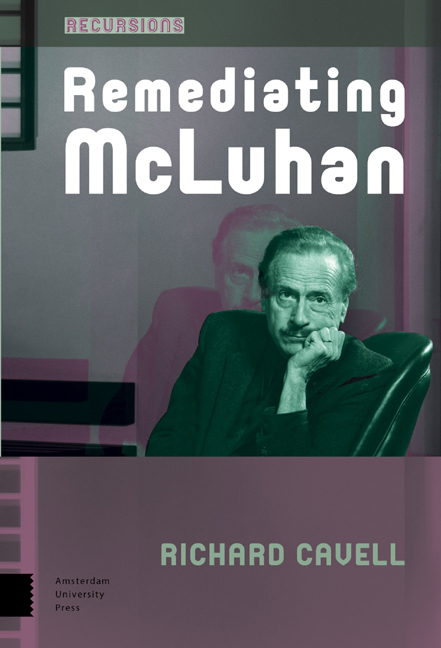Book contents
- Frontmatter
- Dedication
- Contents
- Introduction
- List of sigla
- I
- Re: Mediation
- 1 Beyond McLuhanism
- 2 McLuhan and the Question of the Book
- Embodiment as Incorporation
- 3 McLuhan and the Body as Medium
- 4 McLuhan, Tactility, and the Digital
- 5 Mechanical Brides and Vampire Squids
- Empathic Media
- 6 McLuhan: Motion: e-Motion: Towards a Soft Ontology of Media
- 7 Re-Mediating the Medium
- Determining Technology
- 8 McLuhan, Turing, and the Question of Determinism
- 9 Angels and Robots
- Being Mediated
- 10 Marshall McLuhan’s Echo-Criticism
- 11 McLuhan and the Technology of Being
- II
- 12 The Tragedy of Media: Nietzsche, McLuhan, Kittler
- Coda: On the 50th Anniversary of Understanding Media
- Notes
- Works Cited
- Index
12 - The Tragedy of Media: Nietzsche, McLuhan, Kittler
Published online by Cambridge University Press: 12 December 2020
- Frontmatter
- Dedication
- Contents
- Introduction
- List of sigla
- I
- Re: Mediation
- 1 Beyond McLuhanism
- 2 McLuhan and the Question of the Book
- Embodiment as Incorporation
- 3 McLuhan and the Body as Medium
- 4 McLuhan, Tactility, and the Digital
- 5 Mechanical Brides and Vampire Squids
- Empathic Media
- 6 McLuhan: Motion: e-Motion: Towards a Soft Ontology of Media
- 7 Re-Mediating the Medium
- Determining Technology
- 8 McLuhan, Turing, and the Question of Determinism
- 9 Angels and Robots
- Being Mediated
- 10 Marshall McLuhan’s Echo-Criticism
- 11 McLuhan and the Technology of Being
- II
- 12 The Tragedy of Media: Nietzsche, McLuhan, Kittler
- Coda: On the 50th Anniversary of Understanding Media
- Notes
- Works Cited
- Index
Summary
Is this my own voice that I hear—carried on the wings of the air?
Sophocles, Oedipus TyrannusFriedrich Kittler asserts provocatively in Gramophone Film Typewriter that Nietzsche heralds media philosophy in his statement ‘“[o]ur writing tools are also working on our thoughts”’ (quoted p. 200). This reference to Nietzsche opens a significant historical and critical avenue onto media philosophy as practiced not only by Kittler but also by McLuhan, despite the fact that McLuhan's media philosophy emerged from a rhetorical tradition that was only partly related to the philosophical tradition in which Kittler saw himself to be the mediatic heir of Nietzsche. Yet this philosophical tradition is key to the emergence of media philosophy as a discourse that raises significant epistemological and ontological questions, questions that begin to emerge with Nietzsche's rethinking of the very idea of philosophy as he moved away from abstraction towards materiality. Nietzsche accomplished this rethinking of philosophy mediatically by contesting the shift from akouein to theoria that had been inaugurated by the advent of literacy. In The Birth of Tragedy, the ‘Alexandrian’ (or Socratic) man is specifically identified with ‘a proof-reader blinded by book dust and printer's errors’ (BT 18, p. 100), and ‘the “journalist”, the paper slave of the day’ (BT 20, p. 109) is an avatar of the ‘slave class’ of ‘Alexandrian culture’ (BT 18, p. 98). However, it is ‘with the rebirth of tragedy [that] the aesthetic listener is also reborn’ (BT 22, p. 120, emphasis in translation). As P. Christopher Smith explains, ‘[i]t falls to Nietzsche […] to overthrow the two-millennia-long Platonic-Aristotelian “historical effect”, to reverse, that is to say, the metaphysical […] turn away from the acoustical to the visual’ (Smith, Hermeneutics, p. 296). Through opera, argues Nietzsche, a ‘reverse process, the gradual awakening of the Dionysian spirit in our modern world’ (BT 19, p. 106, emphasis in translation) is taking place. Thus, if today ‘we have to read the Greek gods for allegories of media theory’ (‘Hermes on the Hudson’), as Geert Lovink has suggested, then such readings find their context in the mediatic discourse inaugurated by Nietzsche in The Birth of Tragedy.
- Type
- Chapter
- Information
- Remediating McLuhan , pp. 127 - 148Publisher: Amsterdam University PressPrint publication year: 2016



